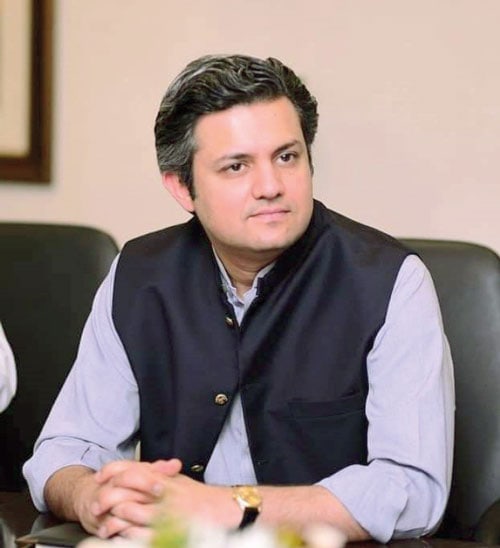Cabinet okays Rs1.39 per unit increase in electricity from Nov 1
Staff Reporter Islamabad
Energy Minister Hammad Azhar announced on Friday that the government planned to introduce a new pricing mechanism to bill consumers for imported gas.
Addressing a press conference alongside Minister of State for Information and Broadcasting Farrukh Habib, Azhar explained the need for the new mechanism as a measure to overcome gas shortage, which he attributed to the depletion of local gas reserves.
In this connection, he said that it had been decided to halt all the ongoing schemes and new connections of Sui gas companies until legislation for the new mechanism was completed.
“Local gas reserves [are] depleting at a rate of 9pc per annum. Govt does not have legal mechanism to collect costs of imported gas from consumers.
We have forged a consensus on new pricing mechanism but till its legislation, govt is halting all expansion in domestic gas networks,” he said in a tweet.
“Currently, just 28pc of the total households are getting piped gas,” he said, adding that local gas reserves had been depleting at such a rapid pace that the commodity was now insufficient for fertiliser and other industries.
The minister said it was often proposed that the government should procure more liquified natural gas and induct it in gas pipelines supplying gas from local reserves to reduce the shortage.
He ruled out this suggestion as a solution to the problem, pointing out the absence of the infrastructure needed to induct imported gas in pipelines beyond a limit amount of 1,200-1,300 million cubic feet per day (mmcfd).
Moreover, he said, it had been seen over the past years that the induction of imported gas into the pipelines here had caused a loss of Rs35-40 billion to Sui gas companies, as the utilities couldn’t charge the consumers for the imported gas separately.
Therefore, he explained, “we are bringing a new pricing mechanism to bill consumers for imported gas,” so that when the imported gas was inducted in domestic pipelines, gas companies did not face huge financial losses. “
This (new pricing mechanism) is called weighted average cost,” he added. Azhar said legislation on the matter was pending and until the system was introduced, the expansion of domestic gas networks had been halted.
“Unlike previous governments, we cannot keep on developing the infrastructure for meeting the demand for gas without increasing the commodity’s supply.”
He also dispelled reports of gas shortage in the country being a consequence of insufficient procurement of LNG, saying that there was enough LNG in the system.
Speaking about the rise in the power tariff, he said the government had proposed to the National Electric Power Regulatory Authority to increase the electricity price by Rs1.39 per unit, applicable from November 1.
“However, we will also be introducing a new QTA (quarterly tariff adjustment) of 15 to 24 paisas from November 1, and so the increase will amount to Rs1.10,” he added.
The minister said the increase would not apply to consumers using less than 200 units of electricity. He added that the government had also announced a seasonal electricity package, under which consumers would be supplied electricity at discounted rates during the winter.
Outlining measures taken to improve recoveries and losses in the power sector, Azhar said the circular debt, which had been increasing at a rate of Rs450bn when the PTI formed the government, was now expanding at a reduced rate of Rs150bn.
“However, we need to take more steps to further narrow this gap and we are taking measures in this regard,” he added.
Speaking during a press conference in Islamabad, Azhar said that this increase in power tariff of Rs1.49 will be applicable from November 1.
“We now have the capacity to generate enough electricity, therefore we want to increase the demand. We introduced an industrial package last year which has been successful as we have seen a 15% increase in demand,” the minister said.
“Meanwhile, we have also seen a 6-7% increase in the demand for electricity as the peak hours for the industrial sector have been removed.”
The minister said that keeping in view the success of this package, the government decided to introduce another package, known as the seasonal electricity package, under which consumers who use an extra unit compared to their last year’s usage will get an extra discount.
Shedding light on further steps, he said that the government has closed old generation companies (gencos), while the National Electric Power Regulatory Authority has also revised its target from 15% to 13%.
“Despite all this, there is a difference between Rs1.5 to Rs2 in the rate at which the government is purchasing and selling electricity, this is the reason behind surging circular debt,” he said.
“A major chunk of circular debt is because of capacity payments. And because of the wrong decisions taken by the previous governments, we have to increase the power tariff,” he said, adding that the government had proposed to NEPRA that the power tariff should be increased by Rs1.49 per unit.
“This increase in power tariff will not be applicable to the lifeline and domestic consumers’ who use less than200 units of electricity’ hence, this increase is not applicable on the 46% of the consumer base,” he clarified.
Moreover, this will not affect the seasonal electricity package or the industrial package.










